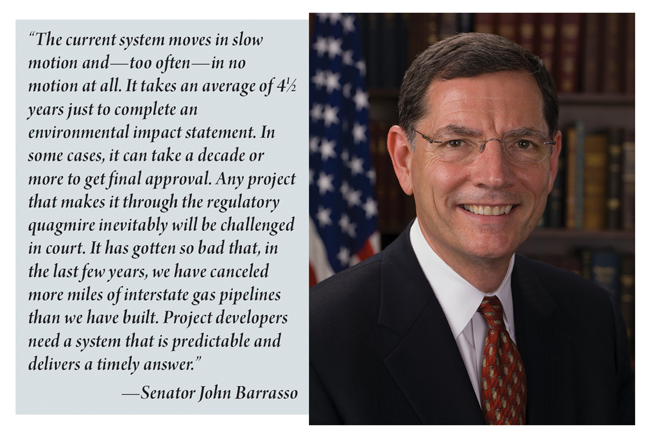
2023 Babst Calland Report—Legal & Regulatory Perspectives For The Energy Industry
Featuring a Briefing from U.S. Senator John Barrasso
PITTSBURGH—In “The 2023 Babst Calland Report—Legal & Regulatory Perspectives for the Energy Industry,” which offers updates on top legal and public policy matters confronting the country’s oil and natural gas industry, U.S. Senator John Barrasso, R-Wy., stresses the importance of permitting reform. The law firm’s annual report also explores several other major topics, including climate policy and ESG matters, as well as trends in litigation,
“The U.S. energy sector remains as dynamic as ever as Babst Calland offers its 13th annual perspective on the challenges and opportunities facing all parts of the energy value chain,” the report opens. “This year, U.S. natural gas production and demand is expected to reach record highs. Natural gas production has doubled since 2006 and increasing demand has turned the United States into a leading global natural gas producer. Investments in liquified natural gas infrastructure continue as the United States becomes the top LNG exporter in the world.”
Principles For Reform
Barrasso’s briefing appears in a short video introduced by Babst Calland attorneys A.A. Moore Capito, a shareholder in the Charleston, W.V., office, and Jim Curry, managing shareholder in the Washington office. They also close the video by reflecting on the senator’s remarks.
Barrasso opens by lamenting the extent to which the Biden administration’s energy policies have frustrated U.S. production of traditional energy sources.
When Barrasso began his Senate tenure in 2007, he recounts, the United States imported 29% of its energy, but by 2019, U.S. producers had transformed the country into a net energy exporter. Although growing domestic production has boosted the U.S. economy, secured its energy supply and assisted the country’s allies, Barrasso says Biden has staffed his administration with fossil fuel opponents and blocked traditional energy while pushing for an unrealistic energy transition.
“We are going to be forced to pay for resources and critical resources from China and even Russia; in the end, it is China and Russia that will rake in the green,” Barrasso predicts. “The president also is forcing American consumers to buy expensive new technologies that they don’t want and cannot afford. In doing so, the president is putting our economy and our industries at risk.”
The United States should resume the all-of-the-above energy policy that made it an energy superpower, the senator urges. “One way is to reform the horrendously complicated federal permitting system to speed up infrastructure and mining projects,” he suggests.
For blueprints on how to address the system’s worst flaws, Barrasso points to two bills: the “Spur Permitting of Underdeveloped Resources (SPUR) Act,” which he introduced, and the “Revitalizing the Economy by Simplifying Timelines and Assuring Regulatory Transparency (RESTART) Act,” by Senator Shelley Moore Capito, R-W.V.
“The current system moves in slow motion and—too often—in no motion at all,” he describes. “It takes an average of 41⁄2 years just to complete an environmental impact statement. In some cases, it can take a decade or more to get final approval. Any project that makes it through the regulatory quagmire inevitably will be challenged in court. It has gotten so bad that, in the last few years, we have canceled more miles of interstate gas pipelines than we have built. Project developers need a system that is predictable and delivers a timely answer.”
Earlier this year, the House of Representatives passed HR 1, the “Lower Energy Costs Act,” an event that Barrasso says gives the Senate an opportunity to consider meaningful reform. Unfortunately, he laments, the permitting bill pushed by Senate Majority Leader Charles Schumer, D-N.Y., preserves the system’s most dysfunctional aspects.
According to Barrasso, the SPUR and RESTART acts incorporate a few fundamental principles.
“First, real reform must benefit the entire country, not a narrow range of special interests,” he emphasizes. “Instead of putting a thumb on the scale for politically favored technologies, our proposal is technology- and fuel-neutral. Second, real reform needs to include enforceable timelines for environmental reviews.
“Third, real reform must place time limits on legal challenges to prevent endless litigation, intended solely to kill projects. Finally, real reform must prevent the executive branch from hijacking the process to meet its own policy preferences.”
Reliable Power
Permitting reform also will allow domestic companies timely and efficient access to the United States’ considerable mineral deposits, Barrasso maintains. “They are worthless if you cannot get them out of the ground,” he considers. “Our competitors in China move much faster.”
The country should develop a domestic uranium supply chain for everything from mining to processing to reactors, the senator suggests, and stop prematurely shutting down existing fossil fuel electrical generation. Both the Federal Energy Regulatory Commission and the North American Electric Reliability Corporation have raised concerns about the U.S. electric grid, he notes.
“Just 10 years ago, fossil and nuclear plants made up 82% of the electricity generating capacity in the lower 48 states; wind and solar accounted for just 6%,” Barrasso observes. “Today the figures are 70% and 19%, respectively. Electricity generation for coal, gas and nuclear power is being shut down faster than less reliable sources are coming on line. That is what members of both FERC and NAERC testified to the Senate Committee on Energy and Natural Resources. The way to restore balance to our electric grid is to restore balance to our energy policy.”
An all-of-the-above energy policy once yielded American energy independence and affordability, Barrasso indicates, and there should again be a place for all energy resources. “It is the key to a diverse, secure and affordable and reliable energy supply,” the senator argues. “It’s what Americans want. It’s what America needs. It is what Wyoming and the rest of America can deliver and will deliver if Washington will just get out of the way.”
In their remarks concluding the video, Curry and Capito note that permitting reform constitutes the central theme of Barrasso’s remarks. “Congress and the administration sort of made a down payment on permitting reform earlier this year,” Curry says in reference to the “Fiscal Responsibility Act” debt limit bill Biden signed in early June. “It sounds like those efforts will continue in earnest here in the fall.
“It’s clear the senator views all these issues not just through the lens of energy, domestically, but also as a national security and global competition issue,” he adds. “If we want to compete in the global energy marketplace, we really need to be able to make these things, domestically.”
In The Courts
In the report’s section on litigation trends, Babst Calland shareholders Timothy M. Miller and Jennifer J. Hicks consider a variety of novel lawsuits.
“Many law firms that traditionally focused on personal injury and tort claims have seen the impact of tort reform on their bottom line, and some defense firms are now taking more plaintiff cases for the same reason,” the section begins. “The influx of ‘new’ entrants to the energy litigation field, coupled with the perceived greener pastures in energy litigation, has resulted in many new suits asserting variations on traditional energy litigation themes. The following trends demonstrate a need for vigilance in lease drafting and contract administration and awareness of the new litigation risks.”
The report highlights variations on:
- Trespass claims;
- Royalty claims;
- Challenges to the lessee’s method of operations;
- Infrastructure challenges; and
- Private suits to bypass regulatory authorities.
Regarding trespass claims, the report indicates the Appalachian Basin’s typical title and lease instruments predate shale production. “Recent cases in Ohio and West Virginia have been based on the absence of broad grants of all minerals to claim drilling in formations that were not specifically leased constitutes a willful trespass,” it notes. “Claims like these need to be identified in the leasing and pre-drilling process, and where possible, corrective instruments or ratifications should be obtained.”
Meanwhile, it continues, much of the basin’s royalty litigation stems from West Virginia’s 2006 Estate of Tawney ruling that undermined the traditional rules of contract construction regarding post-production costs. Since that ruling, lessees have tended to draft leases that attempt to carefully detail post-production costs and deduction calculation methods, but litigation continues to proliferate, Babst Calland says.
The report details a couple cases as examples and concludes, “17 years after Tawney, numerous challenges to every variation of lease royalty clauses continue to be filed.”
Turning to operational methods, the report points to the basin’s longstanding rules regarding the “rule of capture” and operators’ discretion under the “prudent operator” standard. Nevertheless, the firm notes, lessors in a growing number of cases are challenging how units have been formed, how wells were drilled, and whether wells from adjoining units or properties may be causing gas to migrate away from the lease.
“One such suit alleges damages even though a well has been drilled and the lease is held by production,” the report notes. “The lessor alleges the operator should have nevertheless drilled all the potential laterals on the lease at the outset of lease operations to avoid the possibility that the reservoir pressure may be reduced by other units and wells on adjoining or nearby properties. While the lessor has asserted in amended pleadings claims that there has been some physical damage to the reservoir from fracturing on the adjoining properties, the claims appear to be a back-handed challenge to the rule of capture and operator discretion rules.
“While these cases would seem to clearly run afoul of longstanding jurisprudence in the basin, the search for new claim theories and test cases seems to be increasing,” Babst Calland assesses.
Regarding infrastructure lawsuits, the report predicts the basin’s multifaceted legal challenges to pipelines, compressors and other infrastructure will continue. “Only due to provisions in the Fiscal Responsibility Act has the Mountain Valley Pipeline been able to resume construction,” it notes. “Efforts to prevent construction of infrastructure include use of local governments to try and enact ordinances or regulations which have the effect of preventing construction of wells, compressor stations and related facilities. Climate-change-based advocates will continue to challenge every fossil fuel related project.”
As for private lawsuits that attempt to bypass regulatory authorities, the report acknowledges that operations regulated by state statutes and subject to state agency enforcement powers rarely give rise to private civil action enforcement. Nevertheless, it observes, litigants seeking novel ways to bring claims are asserting that state agencies have failed to fulfill their duties.
“An example are cases filed in Pennsylvania and West Virginia seeking to have declared that wells allegedly nearing end of life must be plugged and abandoned even though the state regulatory agencies with jurisdiction over enforcement of plugging and abandonment obligations have allowed the continued operation of the wells,” the report illustrates. “The determination of whether a well is at the end of its useful life is typically an operator and agency determination, but private lessors now seek to bypass the state agencies’ decisions that have been made and impose plugging and abandonment obligations by judicial decree.”
Nongovernmental organizations and other parties who disagree with regulators’ decisions have made similar claims in coal mining and other energy fields, the report indicates. “These cases are on the upswing and are being filed in venues where the claimants feel they have the most favorable chances of success,” Babst Calland maintains.
“In short,” the firm says, “there are sophisticated parties and law firms asserting new claims and theories testing the boundaries of traditional energy law in the basin, and clients are encouraged to be vigilant to detect and be prepared to defend these cases.”
For other great articles about exploration, drilling, completions and production, subscribe to The American Oil & Gas Reporter and bookmark www.aogr.com.







